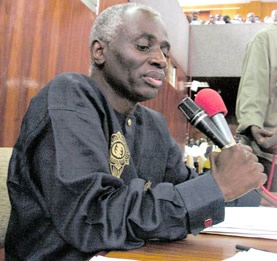Former Presidential Aspirant of the New Patriotic Party, Dr. Arthur Kobina Kennedy has questioned the principles of Mr. Tsatsu Tsikata, Lead Counsel of the governing National Democratic Congress in the ongoing election petition case.
Reacting to a reflective piece written by Mr. Tsikata on June 18, 2013 to commemorate the fifth anniversary of his imprisonment in 2008 for causing financial loss to the state, Dr. Arthur Kennedy wondered why the former CEO of the Ghana National Petroleum Corporation (GNPC) did not fight for the rights of innocent people who were suppressed by Former President Jerry Rawlings’ military regime when he served as one of his close Advisors.
In his reflective piece titled “five years on – His mercies never fail”, Mr. Tsikata said his release from prison as a result of a presidential pardon by former President John Kufuor was nothing short of a “miracle”.
He said his life hung on a thin string the very day he was thrown into jail. On June 18 2008, an Accra Fast Track High Court presided over by Justice Henrietta Abban, sentenced Mr. Tsikata to a 5-year jail term for willfully causing financial loss to the state and misapplying public funds. He was sentenced on each count, to run concurrently. The court found him guilty on all the counts of causing financial loss of about Gh¢230,000 to the state through a loan he, acting on behalf of the GNPC, guaranteed for Valley Farms Limited, a private cocoa producing company in 1991, and also for misapplying public funds.
Valley Farms contracted the loan from Caisse Centrale, now Agence Francaise de Development in 1991, but defaulted in payment thus, compelling GNPC, which acted as guarantors, to pay the loan in 1996 Tsikata pleaded not guilty to all the charges and was on bail.
According to the judge, it had been the prosecution's case that the law setting up the GNPC specified areas in which the Corporation could invest.
She was of the view that the processing of cocoa could not lead to the production of oil. She pointed out that the prosecution had proved their case beyond reasonable doubt that Tsikata was culpable for the offences he had been charged with.
The case started in 2002 and at a point in time, the Supreme Court ruled that the Fast Track Court trying the case was unconstitutional. This was after Tsikata had challenged its constitutionality. The decision was however, overturned later in a judicial review.
In Mr. Tsikata’s piece, he said: “Five years ago, on June 18, 2008, a judge, without any advance indication that she was going to deliver judgment, pronounced a sentence of five years imprisonment on me. I was taken that afternoon to the Nsawam Medium Security Prison to begin serving my sentence. Within five months of that day, however, I was out of prison and alive in circumstances that were nothing short of a miracle”.
He said: “I continue to thank God for that miracle”.
According to him, on the night of November 15, 2008, after the doors of the cell which “I shared with 10 others had been locked, I had an asthmatic attack, probably the worst in my life”, Mr. Tsikata recalled.
“I could hardly breathe”, he wrote. “In that state it was not possible to lie down to sleep. I sat on a chair by my bed, breaking out into a sweat”, he narrated, adding that: “The cell leader, Yaw, and one other cellmate, noticed there was something wrong….Only the grace of God kept me through those hours of the night of Saturday, November 15, 2008”.
Dr. Arthur Kennedy, however, wrote in an article titled: “Principles and Politics” that: “Unfortunately, throughout the 1980s, Mr. Tsikata served as one of the most influential advisors of Mr. Rawlings during one of the most brutal suppression of our rights”.
He wondered why Mr. Tsikata did not stand up to defend the rights of many people who were “marched to prison and sometimes…executed without due process” during Rawlings’ regime.
“When all this was happening, what did the legal luminary and man of faith do ? Why did he not speak up for those whose rights were being denied? Why did he not pray for or work for miracles for those people. Why did Tsatsu not stand up for those whose rights were abused under the PNDC?” He queried.
He said he was asking “these questions, not to accuse but to seek understanding”.
Dr. Arthur Kennedy, therefore, advised that: “Let us all, together, stand on principle, remember our humanity and our faith and strive to build the Ghana that Nkrumah and Danquah dreamed and died for”.
General News of Thursday, 27 June 2013
Source: XYZ
Arthur K questions Tsatsu's principles













